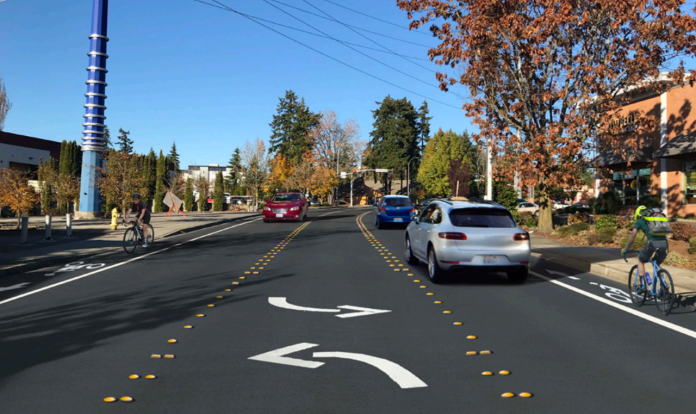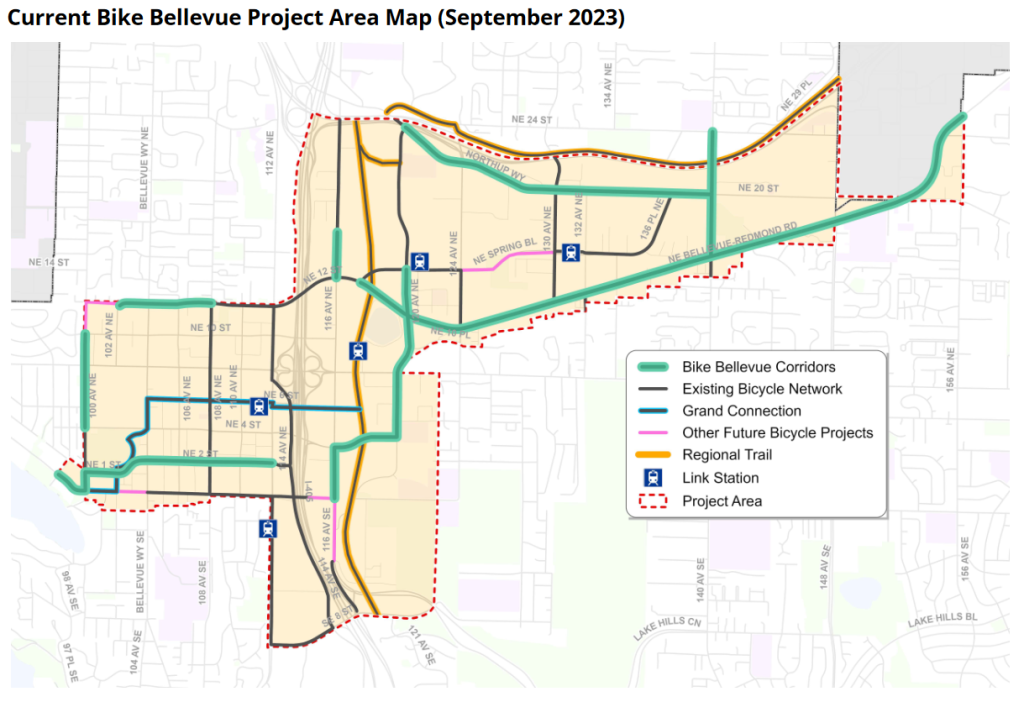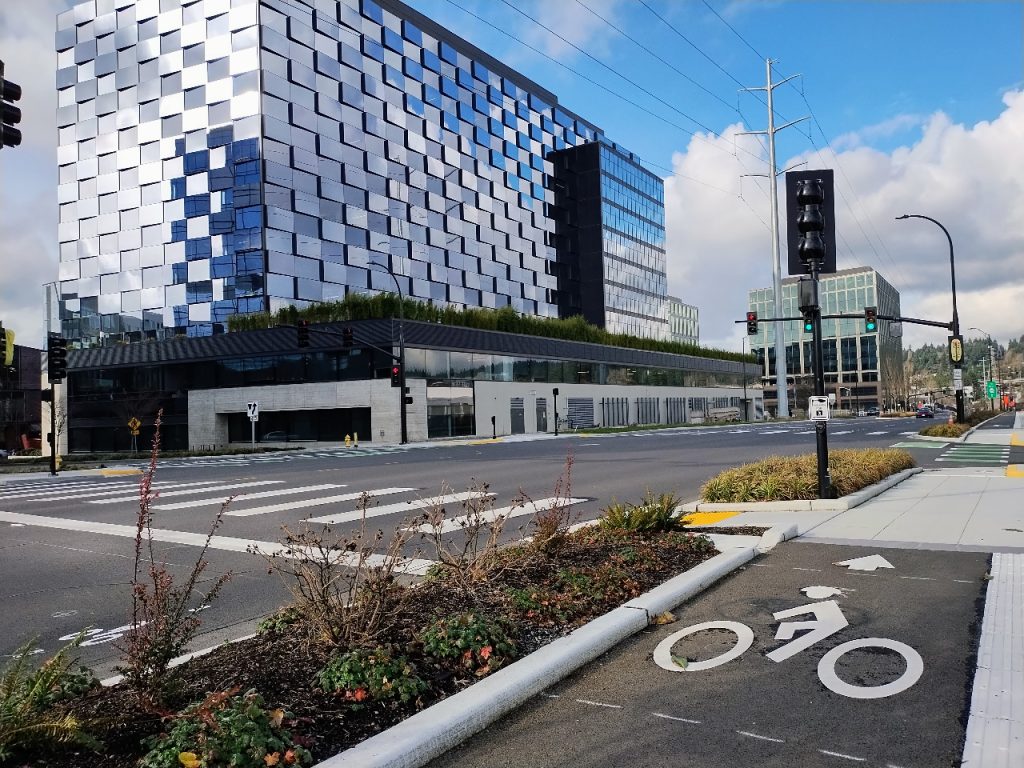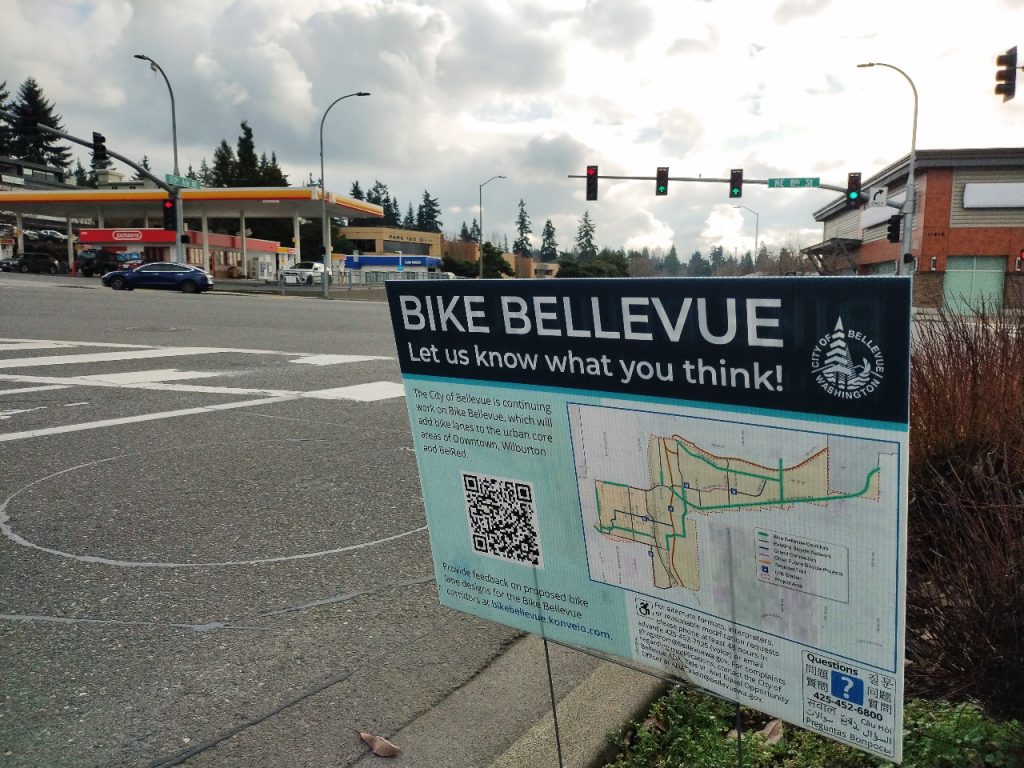
The City of Bellevue’s plan to systematically upgrade a network of major corridors in its fastest-growing neighborhoods to make them safer for walking and biking has hit a major roadblock.
“Bike Bellevue” is the umbrella term for bicycle safety upgrades planned in Downtown Bellevue, and the Wilburton and BelRed neighborhoods. The program is intended to improve mobility, increase safety, and achieve the city’s climate goals, has received strong support from Eastside residents who want to make more trips by bike, but also significant opposition from other residents and business interests who don’t want to see street space reallocated away from cars and trucks.
Over the past few weeks, Bike Bellevue has been removed from calendars outlining the planned agendas for Bellevue’s transportation commission this year. The City had originally been asking for the transportation commission to select which corridors to prioritize for improvements, a recommendation that would then go to Bellevue’s transportation director, Andrew Singelakis. The 11 corridors in the Bike Bellevue network are estimated to cost the City $18.6 million, and so far the council has allocated $4.5 million, so the City has to decide where to start. But there are signs that the City is looking for political cover after the amount of attention that Bike Bellevue has received.

“We’ve had a lot of interest in Bike Bellevue from the community and we’ve received very thoughtful input,” Gillian Hagstrom, a spokesperson for Bellevue’s transportation department, told The Urbanist. “Our project team is taking time right now to review all these comments and consider the best next steps for outreach and advancement of the project.”
Hagstrom confirmed that the City plans to bring Bike Bellevue back to the City Council to get further direction, at a study session set to be held on March 25. Until that time, everything appears to be in limbo.
The pause in Bike Bellevue is occurring against the backdrop of a new plan for Bellevue to add significant housing density over the next two decades, work that will require a robust transportation planning effort that ensures that trips by current and future residents shift to modes other than single-occupant vehicle. Short of that, growth is likely to contribute to gridlock and a deterioration of mobility for everyone.
Bike Bellevue is fairly groundbreaking in comparison to efforts in other cities to create safe space for people biking in that it’s network-based, and not put forward corridor-by-corridor. Corridor planning enables an individual fight over the merits of giving up street space on every single street in question, even though the network as a whole suffers when any one individual element is not able to move forward. But it does mean that Bellevue is receiving pushback on the entire Bike Bellevue plan at once, even though some criticizing individual elements of the plan may not have raised an eyebrow at others. Those voices are joining advocates who are against ceding any street space currently set aside for cars in Bellevue, across the board.

Last week, Bellevue City staff confirmed that Franz Loewenherz, the City’s Mobility Planning and Solutions Manager who has overseen pedestrian and bicycle safety initiatives for years, has been removed from leading Bike Bellevue following an ethics complaint that was filed against him this past December. That complaint focused on allegations that Loewenherz shared fairly anodyne information about Bike Bellevue with media and advocates who would be inclined to support the project, including the Seattle Bike Blog, Cascade Bicycle Club, and Complete Streets Bellevue.
The investigation into Loewenherz’s behavior has already concluded, but its results have not yet been made public, and it’s not clear whether Loewenherz would be put back in charge of the project — one that he has been shepherded from its inception — if he’s found to have not violated city policy.

At last week’s transportation commission meeting, City staff painted the halt in work as routine, with the ethics investigation its main driver. “Bike Bellevue is alive and well… I would describe it as being on a pause right now while the ethics investigation is still in process and concludes,” Paula Stevens, Bellevue’s assistant transportation director, told the commission. “We need to wait until that investigation has concluded to understand where we are with project management and where we go forward.”
So far, the ethics complaint seems to have succeeded in doing what opponents of the project intended by throwing a wrench into the spokes of Bike Bellevue.
The Eastside Transportation Association (ETA), a business-aligned group that describes itself as “committed to advocating for congestion relief” has asked the transportation commission to “request the staff to take a significant step back and reconsider the entire Bike Bellevue Proposal,” according to a letter dated this past December. “The entire plan proposes to significantly increase traffic congestion in the plan area to encourage an insignificant number of trips be added to the current tiny portion of trips made by bicycle. ETA believes that Bellevue has more important transportation issues to deal with,” the group’s chair, Vic Bishop, wrote.
As part of its broader advocacy efforts in Bellevue, the ETA supports the immediate removal of the I-405 express toll lanes and increasing spending on new roadways.
It looks like it will be up to the Bellevue City Council to decide whether to reaffirm support for moving forward with Bike Bellevue, or take things in a different direction.
Ryan Packer has been writing for The Urbanist since 2015, and currently reports full-time as Contributing Editor. Their beats are transportation, land use, public space, traffic safety, and obscure community meetings. Packer has also reported for other regional outlets including Capitol Hill Seattle, BikePortland, Seattle Met, and PubliCola. They live in the Capitol Hill neighborhood of Seattle.


